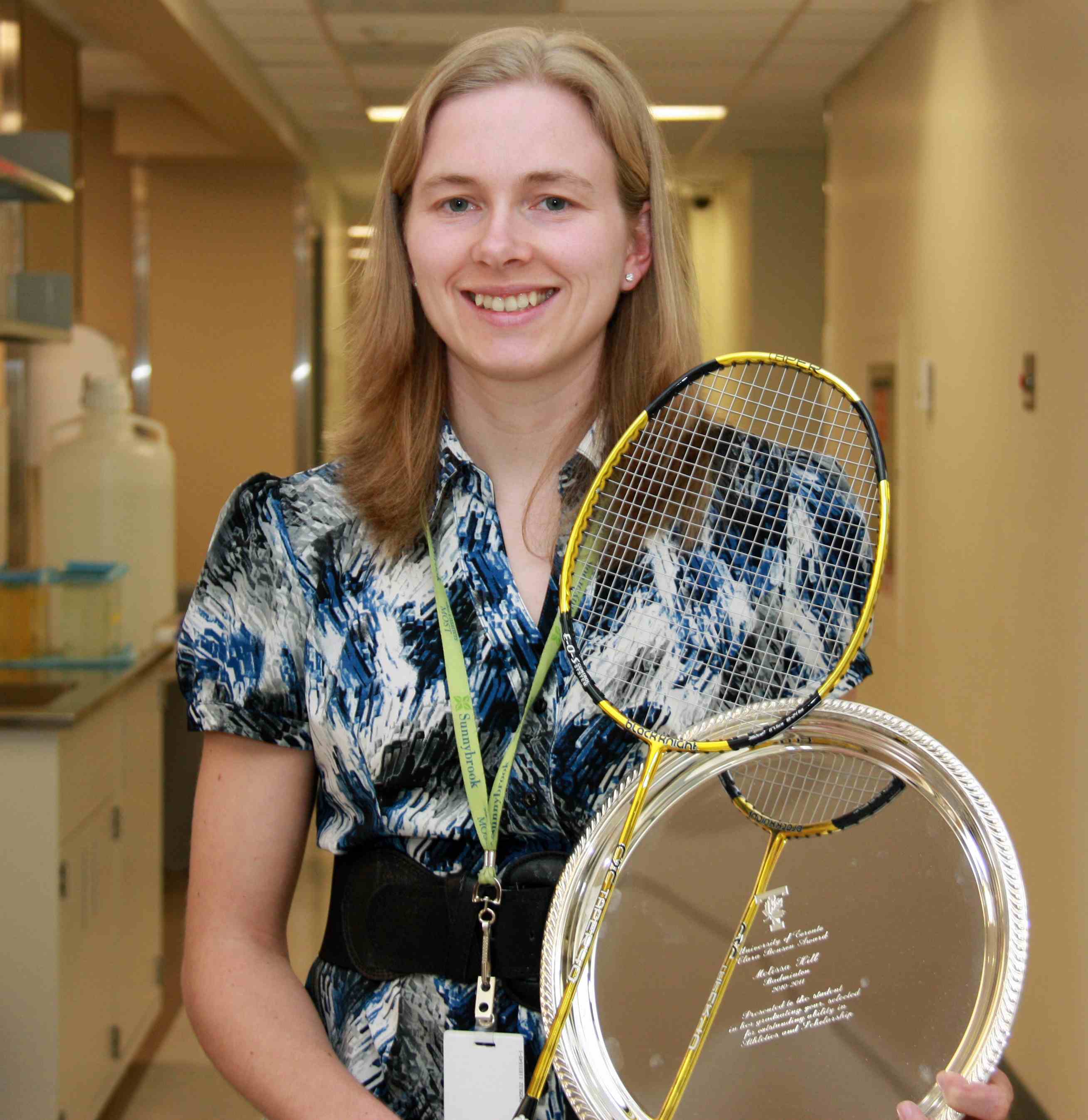'Remarkable' Student Flies High
By Jim Oldfield
What are the odds?
On April 8, 2011, Melissa Hill became the second badminton athlete to win the University of Toronto's Dr. Clara Benson Award, which recognizes a graduating female student for achievements in academics, athletics and community involvement.
The first badminton athlete to win the award was Sandra Stapleton, in 1989. Stapleton was a graduate student in the lab of Dr. Martin Yaffe, a senior scientist in imaging at Sunnybrook Research Institute.
So is Hill.
Yaffe doesn't go looking for badminton players, says Hill, but he did suggest to her - tongue perhaps not entirely in cheek - that she should start recruiting for him. "If I could find more such students, it would be great," Yaffe says, chuckling. "Obviously this award acknowledges people who are pretty remarkable."
Hill is an A+ student who has won several scholarships.
In Yaffe's lab she is developing a way to improve the early detection of breast cancer with contrast-enhanced digital tomosynthesis (a 3-D approach to mammography). Hill has published five peer-reviewed journal articles on her work, two as first author and three as a co-author. "She's an absolutely first-rate student. She can make things happen in the lab," says Yaffe, who is also a professor of medical biophysics at U of T.
On the court, Hill has been no less impressive. She is an 11-time Ontario University Association (OUA) all-star, was the 2006 OUA female athlete of the year, and has won nine OUA team bronze medals and one silver medal.
Hill sat on the U of T Varsity Board for four years, and has travelled to community high schools around Ontario to host clinics for badminton players and coaches. Also a coach-for six years she assisted in coaching the Varsity Blues-Hill helped lead the Ontario team to gold as an assistant coach at the Canada Winter Games in 2011.
Before that win, Hill was accepted into the National Team Coaching Apprenticeship Program, which encourages females to coach at the top level in Canadian sports. She considers it one of her most rewarding achievements. "It was a fantastic experience," she says. "I met coaches from across the province, including Sheilagh Croxon, a two-time Olympic coach for synchronized swimming. She's an amazing, inspiring individual who really passed on a lot to me."
In researching her award acceptance speech, Hill was also inspired by Dr. Benson, who at U of T blazed a trail for Canadian women in athletics and academics. In 1899 Benson became the first woman to earn a Bachelor of Arts degree in chemistry, and was one of only two women to receive a PhD in 1903. She also served on the national board of the YWCA and was the first president of U of T's Women's Athletic Association. "I only hope that in the years to come, I can make a fraction of the impact that this great woman did in the community," Hill wrote in her acceptance speech.
As it turned out, Varsity Blues badminton coach Wayne King had to give that speech on Hill's behalf. Hill was in Paris, France, extending Yaffe's interaction with a research group at a cancer institute-she's been the catalyst that makes the collaboration work, says Yaffe-and with researchers at GE Healthcare, who with the lab are developing new breast imaging technology for use in patients. While she was there GE offered her a job, which she may accept after completing her PhD so she can be with her husband, who recently took a job in Paris.
Another coincidence? Maybe, but it seems the odds of good fortune spike with leadership and hard work. As a player-coach, Hill led by example. Other players, apparently intimidated by her intense training, told her she was like a machine-never tired, never complaining. "That wasn't true. I was exhausted, but I would push myself all the time," says Hill. "That challenged them. They'd say, 'That old woman is working this hard; as an 18-year-old guy I better be working my butt off.'"






